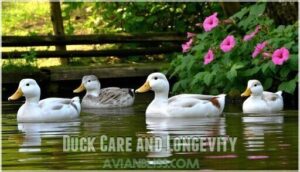This site is supported by our readers. We may earn a commission, at no cost to you, if you purchase through links.

In the wild, ducks typically live 5 to 10 years, but predators, disease, and harsh weather can cut that short.
Domestic ducks, however, often enjoy longer lives—up to 15 years when given proper nutrition, safe housing, and medical care.
Of course, breed plays a role too, Hardy Muscovy ducks may live longer than your charming Pekin.
Think of it like this: with good care, a duck can stick around as long as a family dog, and considering longevity is key, Curious about the specific health tips or care tricks to boost their longevity? Stay tuned.
Table Of Contents
- Key Takeaways
- Duck Lifespan Overview
- How Long Do Ducks Live
- Wild Duck Lifespan Factors
- Domestic Duck Lifespan Factors
- Duck Breed Lifespan Variations
- Factors Affecting Duck Lifespan
- Environmental Impact on Ducks
- Duck Care and Longevity
- Common Health Issues in Ducks
- Maximizing Duck Lifespan
- Frequently Asked Questions (FAQs)
- What is the average lifespan of a duck?
- How long do mallard ducks live?
- How long do ducks live in captivity?
- How long do Bantam ducks live?
- How long do Pekin ducks live?
- Do domestic ducks live longer than wild ducks?
- How long do backyard ducks live?
- What duck lives the longest?
- What is the oldest living duck?
- What is the lifespan of a wild duck?
- Conclusion
Key Takeaways
- Domestic ducks typically live 10-15 years, sometimes up to 20, with proper care like balanced diets, regular health checks, and predator-safe housing.
- Wild ducks usually survive 5-10 years, facing threats like predators, disease, and environmental challenges.
- Duck breed impacts lifespan significantly; for instance, Muscovy ducks can live 18-20 years, while Pekins often reach 12-15 years.
- Good care, including safe housing, proper nutrition, and regular vet visits, is key to maximizing your duck’s lifespan.
Duck Lifespan Overview
Have you ever wondered how long your feathered pond friends actually live?
In this revealing exploration, you’ll discover that duck lifespans vary dramatically between wild and domestic environments, with factors like predation, nutrition, and care playing pivotal roles in determining these remarkable birds’ longevity.
Wild Duck Lifespan
Swimming against survival’s current, wild ducks navigate a challenging life in nature’s complex ecosystem. Their duck lifespan typically ranges between 5-10 years, influenced by numerous environmental factors.
Understanding their wild habitat reveals fascinating insights into waterfowl longevity:
- Predation dramatically impacts duck life expectancy
- Migration routes challenge duck behavior and endurance
- Flock dynamics provide critical survival advantages
- Nesting patterns determine reproductive success
Domestic Duck Lifespan
Despite the challenges in the wild, domestic ducks enjoy a substantially extended lifespan with proper care.
In the comfort of a well-managed habitat, these feathered friends can live up to 20 years, far surpassing their wild counterparts.
| Duck Breed | Average Lifespan |
|---|---|
| Pekin | 12-15 years |
| Muscovy | 18-20 years |
| Mallard-derived | Over 21 years |
Human care transforms their survival odds, offering protection, nutrition, and veterinary support.
Factors Influencing Lifespan
Ever wondered why some ducks live longer than others?
Duck lifespan is a complex interplay of critical factors:
- Genetic factors shape inherent longevity potential
- Nutrition dramatically impacts overall health and survival
- Environmental stress substantially influences mortality rates
Understanding these interconnected elements helps you comprehend the intricate dynamics determining how long your feathered friends might thrive in both wild and domestic settings to achieve their full potential.
How Long Do Ducks Live
Under the surface of every duck’s journey lies a fascinating tale of survival and resilience.
In regard to ducks, their lifespan can surprise even the most seasoned bird enthusiasts.
- Wild ducks typically live 5-10 years
- Domestic ducks can reach 15-20 years
- Some record-holding ducks have lived up to 49 years
- Breed impacts life expectancy substantially
- Environmental factors play a vital role in survival
Bird migration patterns and duck behavior also influence their overall life expectancy.
Understanding these nuanced elements helps you appreciate the remarkable adaptability of these feathered friends in their ever-changing world.
The combination of environmental factors and breed characteristics makes each duck’s story unique.
Ducks are capable of thriving in various conditions, showcasing their resilience.
Wild Duck Lifespan Factors
If you’re curious about wild duck survival, you’ll be surprised by the challenging world they navigate every day.
From predators lurking in their habitat to environmental obstacles, these feathered survivors face incredible odds that dramatically impact their lifespan, including the challenges posed by their environmental obstacles.
Predation and Mortality
Predators ruthlessly target ducks, making survival a high-stakes game in the wild.
Mammalian hunters pose significant mortality risks, with nest predation accounting for most duck offspring loss.
First-year ducks face a mere 30-50% survival rate, as immature waterfowl are harvested at rates 1.25 to 2.5 times higher than adult populations, highlighting the severe impact of mammalian hunters.
Environmental Challenges
After predators take their toll, wild ducks face another silent killer: environmental challenges.
Habitat loss shrinks their living spaces, while water pollution poisons critical ecosystems.
Climate shifts disrupt migration patterns and breeding grounds.
Human activities increasingly squeeze ducks into smaller territories, dramatically reducing their chances of survival and ultimately impacting their already fragile duck lifespan.
Disease and Parasites
When environmental challenges wear down duck defenses, disease becomes a silent predator.
Wild ducks battle an array of health threats, from waterborne illness to fowl diseases that can decimate populations.
Your feathered friends face numerous duck health issues, including:
- Avian flu spreading rapidly
- Parasitic infections weakening immune systems
- Bacterial diseases like duck viral enteritis
- Blood-cell parasites transmitted by midges
- Intestinal coccidia compromising nutritional absorption
Understanding common bird health issues, such as respiratory health problems, is essential for maintaining healthy flocks.
Survival depends on resilience and adaptability to these challenges, making awareness of these issues crucial for the well-being of your ducks.
Domestic Duck Lifespan Factors
If you’re raising ducks, you’ll want to know the key factors that can extend their life and keep them healthy.
Your domestic ducks’ lifespan depends on protection from predators, balanced nutrition, and careful management of their reproductive health.
Protection From Predators
When night falls, your ducks need more than moonlight for protection.
Predator deterrents like sturdy fencing and secure duck housing can be your feathered friends’ first line of defense. Guard animals such as dogs or geese create an additional protective barrier.
Strategic camouflage techniques and well-designed enclosures help shield vulnerable ducks from potential threats lurking in the shadows.
Effective bird conservation methods, including bird friendly practices, can also contribute to a safer environment for your ducks, using protective measures to ensure their well-being.
Nutrition and Health
Protecting your ducks goes beyond fending off predators—it’s about fueling their health through smart nutrition.
A balanced duck diet packed with protein, vitamins, and minerals keeps them thriving.
Water quality matters just as much as feed supplements.
By understanding duck nutrition and providing targeted vitamin needs, you’ll boost their wellbeing and extend their lifespan substantially.
Sex and Production Approach
After nourishing your ducks, understanding their sex-specific needs becomes key to maximizing duck lifespan.
Drake longevity often surpasses female health due to reduced reproductive stress.
Consider these factors:
- Females experience shorter lifespans from intensive egg production
- Drakes require fewer medical interventions
- Breeding methods substantially impact overall duck health
Balancing egg production can dramatically extend your flock’s years of vibrant life.
Duck Breed Lifespan Variations
When exploring duck breed lifespan variations, you’ll discover that each breed has its own unique longevity blueprint.
From the hardy Mallard to the resilient Muscovy, understanding these differences can help you provide the best care for your feathered friends.
Mallard Duck Lifespan
Swimming through life’s challenges, Mallard ducks navigate a remarkable journey spanning 5-10 years in the wild.
Mallard ducks embrace nature’s trials, turning survival into art with resilience honed over a 5-10 year wild journey.
These resilient waterfowl typically survive by adapting to diverse duck habitats, with some individuals stretching their lifespan beyond expectations.
Proper diet, feather care, and understanding flock dynamics can substantially impact their longevity, making each Mallard’s life a tribute to survival’s artistry, with resilient waterfowl and diverse duck habitats being key to their success.
Muscovy Duck Lifespan
Muscovy ducks typically thrive between 8-12 years in wild habitats, with their duck lifespan influenced by intricate breeding patterns and complex waterfowl biology.
Wild predators markedly impact their survival, while their adaptive Duck Behavior helps navigate challenging environments.
Muscovy ducks’ resilience in diverse duck habitats demonstrates their remarkable capacity to overcome environmental challenges, influenced by complex waterfowl biology and intricate breeding patterns.
Pekin Duck Lifespan
After exploring the robust Muscovy duck, let’s turn our attention to the beloved Pekin breed.
These white-feathered charmers typically live 7 to 12 years with proper care. Their duck lifespan depends on diet, housing, and proactive health management.
Pekin ducks excel in egg production and thrive under attentive care, making them a popular choice for backyard farmers seeking reliable, long-lived companions.
Factors Affecting Duck Lifespan
Ever wondered why some ducks live much longer than others in the wild and in captivity?
Understanding the key factors that influence duck lifespan can help you appreciate these fascinating waterfowl and potentially extend their life through proper care and management.
Incubation Period
After exploring breed-specific lifespans, let’s peek into duck reproduction’s early stages.
The incubation period reveals fascinating insights into duck biology and egg development:
- Defines time between egg laying and hatching
- Varies by species from 22-37 days
- Influences overall fertility rates
- Determines brood size potential
- Impacts duck lifespan trajectory
Understanding these intricate hatch timing nuances helps you appreciate the delicate start of a duck’s journey.
Duckling Development
After the egg’s incubation period ends, ducklings emerge with soft down feathers, ready to explore their world.
They quickly learn to swim and walk, guided by their mother’s protection. Within weeks, they’ll develop adult plumage and grow stronger.
Your baby ducks transform rapidly, shedding their vulnerable initial stage and preparing for an exciting journey of duck development and survival.
This process involves a strong instinctual imprinting, including survival instinct, which is essential for their growth and ability to thrive in the wild.
Adult Reproduction
By their first birthday, ducks become sexually mature and ready to enter the realm of reproduction.
Breeding habits reveal fascinating mating rituals where drakes compete for females during winter courtship.
Female ducks typically produce one brood annually in the wild, with domestic varieties potentially raising 3-4 clutches, and their reproductive health directly impacts overall duck lifespan and fertility rates.
Environmental Impact on Ducks
You’ll be shocked to learn how environmental factors dramatically impact duck survival rates in the wild.
From habitat destruction to pollution and climate change, these challenges can substantially reduce a duck’s lifespan and threaten entire populations.
Habitat Destruction
When environmental changes disrupt duck habitats, the consequences ripple through entire ecosystems.
Wildlife displacement becomes a stark reality for these feathered survivors. Consider how habitat loss impacts duck populations:
- Wetland reserves shrink dramatically
- Natural breeding grounds disappear
- Migration pathways become fragmented
Duck conservation demands immediate attention to protect these vulnerable species from environmental degradation. Understanding habitat ecology is the first step toward meaningful preservation efforts.
Pollution and Toxins
When habitat loss strikes, another silent killer lurks: pollution.
Pollution silently poisons duck habitats, turning once-thriving ecosystems into toxic traps that threaten their survival and reduce their lifespan.
Toxic waste and chemical exposure can dramatically shorten a duck’s lifespan, turning pristine water habitats into toxic traps.
Hazardous substances accumulate in their bodies, disrupting critical bodily functions.
From mercury contamination to industrial runoff, ducks face invisible threats that compromise their health and survival in ways you might never imagine, including the impact of toxic traps.
Climate Change
Climate’s duck-destroying domino effect threatens waterfowl survival like never before.
Rising temperatures and unpredictable weather patterns create massive challenges for these resilient birds.
Here’s how climate change hammers duck populations:
- Sea level rise destroys critical nesting habitats
- Ecosystem disruption reduces food availability
- Extreme weather events increase duckling mortality rates
These environmental factors dramatically compress duck lifespan in the wild, leading to a significant impact on duck populations and their overall survival.
Duck Care and Longevity
If you want your ducks to live a long, healthy life, you’ll need to master the art of thorough care and proactive management.
Your commitment to providing safe housing, balanced nutrition, and routine medical attention can substantially extend your ducks’ lifespan and guarantee they thrive in your care, which is essential for their overall wellbeing.
Providing Safe Housing
Your ducks need a fortress, not just a shed. Smart coop design protects against predators with sturdy fencing and secure nesting boxes.
Build a spacious duck house that offers shelter from wind and rain, using materials like cedar or treated lumber. Keep your housing clean, well-ventilated, and large enough for comfortable movement—your feathered friends will thank you.
Proper birdhouse design incorporates features like predator guard systems to guarantee a safe environment for the ducks.
Proper Nutrition and Vitamins
At the heart of duck longevity, proper nutrition and vitamin supplements play a critical role.
You’ll want to focus on balanced meals that provide essential nutrients, supporting peak duck health and extending their lifespan.
High-quality duck feed enriched with targeted vitamins guarantees strong immune systems, robust growth, and sustained energy for these fascinating feathered friends.
A well-planned diet that includes duck food supplements is vital for maintaining their overall health.
Medical Care and Vaccinations
Step up your duck health game by prioritizing preventive Duck Vaccines and regular Health Checks.
Proactively schedule annual veterinary consultations to catch potential duck illnesses early.
Your Medical Interventions can make the difference between life and death, ensuring Disease Prevention through thorough Veterinary Care that addresses emerging duck health challenges swiftly and effectively.
Effective duck care involves understanding Duck Vaccine options to make informed decisions about their health.
Common Health Issues in Ducks
You’ll face critical health challenges when raising ducks that can substantially impact their longevity and quality of life.
Understanding and proactively managing these health issues, from obesity to parasitic infections, will help you guarantee your feathered friends remain vibrant and resilient throughout their lifespan.
Obesity and Leg Problems
Nearly 20% of domesticated ducks struggle with obesity-related leg problems that can dramatically reduce their lifespan.
Understanding these health challenges is vital for duck owners who want to keep their feathered friends mobile and healthy.
- Extra weight strains duck joints and leg muscles
- Obesity increases risk of painful mobility issues
- Poor nutrition contributes to leg and foot problems
Proper diet, exercise, and weight management are key to preventing leg issues and supporting long-term duck health.
Disease Prevention and Treatment
A staggering number of ducks face life-threatening illnesses that can dramatically shorten their lifespan.
Effective disease prevention and treatment are vital for maintaining duck health.
Here’s a quick guide to addressing duck health challenges:
| Disease | Prevention Strategy |
|---|---|
| Duck Viral Enteritis | Vaccination |
| Respiratory Infections | Biosecurity |
| Aspergillosis | Clean Environment |
| Botulism | Proper Nutrition |
| Parasitic Diseases | Regular Vet Checks |
Understanding viral disease causes is essential for developing effective prevention strategies.
Proactive health monitoring and timely veterinary intervention can save your feathered friends’ lives, emphasizing the importance of veterinary intervention and overall duck health.
Parasite Control
Parasite management is the silent guardian of duck health, protecting these feathered friends from microscopic threats.
Regular deworming methods and fecal testing can combat internal parasites effectively. External treatments prevent mites and lice from compromising your ducks’ well-being.
By staying vigilant and implementing strategic health protocols, you’ll substantially reduce duck disease risks and extend their vibrant lifespan.
Maximizing Duck Lifespan
If you’re keen on helping your ducks live their best, healthiest lives, understanding the critical factors that influence their longevity is essential.
By implementing strategic care practices and minimizing environmental risks, you’ll substantially enhance your feathered friends’ chances of thriving well beyond their expected lifespan.
Preventing Predation
After tackling common health challenges, protecting your ducks from predators becomes paramount.
Guard your feathered friends with these strategic predator deterrents:
- Install robust perimeter fencing with small mesh openings
- Utilize motion-activated lighting around duck housing
- Introduce guard animals like geese or dogs
- Create elevated and enclosed night shelters
- Implement camouflage techniques for nest protection
Your vigilance can mean the difference between survival and loss, and by taking these steps, you can ensure the survival of your ducks.
Reducing Environmental Risks
After securing your ducks from predators, you’ll want to shield them from environmental threats.
Habitat conservation plays a critical role in extending duck lifespan, focusing on maintaining water quality, protecting natural ecosystems, and supporting wildlife preservation efforts.
Climate action helps preserve duck population dynamics, ensuring these feathered friends can thrive in changing landscapes.
Effective water management systems, including proper water filter systems, are essential for maintaining a healthy environment for ducks, which is crucial for their well-being and supports wildlife preservation efforts.
Promoting Overall Health and Wellbeing
Improving duck lifespan means focusing on duck care through balanced duck nutrition, regular health checks, and proper living conditions.
Use vitamin supplements to strengthen duck health, while meeting exercise needs to keep them active and fit.
Stress management is essential—calm environments promote duck wellbeing.
Address these factors thoughtfully, and you’ll boost both duck lifespan and quality of life dramatically.
Frequently Asked Questions (FAQs)
What is the average lifespan of a duck?
Duck durability depends on setting and species.
Wild ducks often withstand 5-10 years due to predators and perilous conditions.
Domestic ducks enjoy safer, sweeter lives, stretching up to 15-20 years with proper care.
How long do mallard ducks live?
Mallard ducks usually live 5-10 years in the wild, depending on factors like predators, weather, and disease.
In captivity, with proper care and no threats, they can live up to 15 years.
How long do ducks live in captivity?
You might think ducks don’t live that long, but in captivity, proper care changes everything.
Domestic ducks typically live 10-15 years, sometimes over 20, with balanced diets, veterinary care, and predator-safe environments extending their lifespans.
How long do Bantam ducks live?
Bantam ducks, known for their petite stature, often outlive larger breeds, thriving up to 15 years with proper care.
Regular health checks, predator protection, and quality nutrition can give your Bantam a long, happy life.
How long do Pekin ducks live?
Imagine this scenario: Pekin ducks waddling through life with charm can live around 5-10 years, typically longer in well-cared-for environments.
Proper nutrition, predator protection, and a safe habitat substantially boost their potential lifespan.
Do domestic ducks live longer than wild ducks?
Domestic ducks generally outlive wild ducks.
Protected from predators, diseases, and harsh weather, they enjoy better care, nutrition, and housing.
With proper management, domestic ducks often live 10-20 years, while wild ducks face shorter lifespans.
How long do backyard ducks live?
Backyard ducks, with proper care, can live 10-15 years, sometimes over
They thrive with balanced diets, fresh water, and predator-safe shelters.
Lower stress and attentive care help them enjoy longer, healthier lives.
What duck lives the longest?
The longest-living duck on record was a Pekin duck that reached 49 years.
Most domesticated ducks, like Bantams, tend to live 15-20 years with proper care, far outliving their wild counterparts.
What is the oldest living duck?
The oldest duck ever recorded was a Pekin duck named Desi, living 49 years.
While rare, proper care, balanced nutrition, and protection from harm make it possible for a duck to truly beat the odds.
What is the lifespan of a wild duck?
Wild ducks typically live 5-10 years, but nature throws plenty of curveballs.
Predators, disease, and weather challenges can cut their lives short.
Survival often depends on the duck’s breed, environment, and a little luck.
Conclusion
When all’s said and done, understanding how long ducks live depends on their care and environment.
Wild ducks face predators and harsh conditions, while domestic ducks, with proper nutrition and protection, can thrive for 10-15 years.
You’ll want to focus on providing safe housing, balanced food, and regular health checks to maximize their lifespan.
Different breeds, like Muscovies or Pekins, vary in longevity, but every duck benefits from attentive care.
Your efforts can make their years longer and happier, with a potential to live up to 10-15 years.
- https://www.allaboutbirds.org/guide/Muscovy_Duck/lifehistory
- https://en.wikipedia.org/wiki/Mulard
- https://www.oxfordmail.co.uk/news/17629305.worlds-oldest-duck-family-pet-turns-21/
- https://www.dailymail.co.uk/news/article-7014283/Ernie-waddles-record-books-worlds-OLDEST-pet-duck-reaching-age-21.html
- http://news.bbc.co.uk/2/hi/uk_news/england/hampshire/8434907.stm











